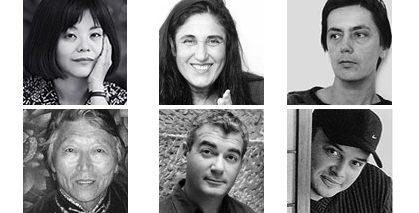Literture and Migration
Hardly Anybody Any Longer Says “Immigrant”

Ever since Melinda Nadj Abonji won the 2010 German, and soon thereafter Swiss, Book Prize for her novel „Tauben fliegen auf“ (i.e., Doves Take Wing), hardly anybody any longer has made much of a fuss about a number of writers whose mother tongue is not German but whose works have lastingly enriched German literature. It has become perfectly natural to see in Rafik Schami, Zsuzsanna Gahse, Terézia Mora, Michael Stavarič and Artur Becker notable contemporary German-language authors. It was a long way.
From trickle to flood
That German literature was never a purely German affair was nearly forgotten in the course of the nineteenth and above all the twentieth century. Exceptions such as Elias Canetti proved the rule that really important literature in the German language can of course only be written by native speakers. It is true that West Germany sporadically registered that at least since 1970 there existed a so-called “guest worker literature”, but it was not taken seriously. An exception was the great scholar of Romance languages and linguist Harald Weinrich, who early on called for a “German literature from outside” and, together with committed colleagues and the support of the Robert Bosch Foundation, launched the Adelbert von Chamisso Prize.
When the prize was awarded for the first time in 1985, people mainly spoke of “foreigners’ literature” and later of “literature of immigration”. It took nearly two decades before Libuše Moníková, Yoko Tawada, Emine Sevgi Özdamar, Ilija Trojanow, Catalin Dorian Florescu and Galsan Tschinag were looked upon as important writers of the German language. Genuine poets such as Adel Karasholi, José F.A. Oliver, Zehra Çirak and Jean Krier had an even more difficult time of it. At the beginning of the twenty-first century, however, it became ever clearer that the former trickle had now become a flood and notable literature in German could also be written by authors who grew up with a very different mother tongue and come from cultures that have little in common with the German or Central European world.
Immigration – out, but not passé
The country from which you come, or the first years in the country to which you have more or less voluntarily emigrated, are naturally not simply forgotten. Anila Wilms, born in 1971 in Tirana, even sets her debut novel, Das albanische Öl oder Mord auf der Straße des Nordens (2012) (i.e., Albanian Oil, or Murder on the Street of the North), at the time of the beginning of the Albanian state and so introduces most of her German readers to a country of origin little-known in their literature. Francesco Micieli, a writer of Italian origin who lives in Bern, recalls in his magnificent story Schwazzenbach (2012) the not-so-funny 1970s when the book’s narrator Angelo is constantly confronted by the emotionally heated mood of “Italians out!”.
The impressive novels of György Dalos, most recently Der Fall des Ökonomen (2012) (i.e., The Case of the Economist), take place in Hungary, and the Dalmatia of her childhood resonates in all the works of the Berlin writer Marica Bodrožić, most recently Kirschholz und alte Gefühle (2012) (i.e., Cherry Wood and Old Feelings). For Bodrožić, by the way, the word “immigrant” simply sounds like a serious illness. Like many other writers, wherever they come from, at some point she resolved to make German the language that she writes in and to write German literature, as once did Adelbert von Chamisso. His Peter Schlemihl (1813) may be many things, but one thing it is not is “immigrant literature”.
Intercultural basic chords
That “immigrant literature”, which Feridun Zaimoglu in 2006 already called a dead carcass”, has now given way to an interculturally grounded German literature, often of highest quality, was shown plainly by the Book Year 2012. One of its success stories is the novel Der Russe ist einer, der Birken liebt (i.e., A Russian Is Someone Who Love Birch Trees) by the 27-year-old Berlin author of Azerbaijani extraction Olga Grjasnowa. Mascha, the protagonist, hates the phrase “immigrant background”, and hates even more the adjective “post-immigrant”. In her novel Wer ist Martha? (i.e., Who Is Martha?), Marjana Gaponenko, born in 1981 in Odessa and now resident in Mainz, tells of the last weeks in the life of the 96-year-old ornithologist Luka Lewadski with an opulent linguistic pathos and not without hilarious elements of slapstick – interculturally grounded down to the syntax, but hardly a work to be filed under “immigrant literature”. Grjasnowa and Gaponenko are only two examples of the new contemporary German literature, realistically and colorfully conjured up on the page with notable stylistic elegance. Where do these authors come from? What is their mother tongue? Oh, yes, you could also ask about that. If nothing else occurs to you.
- Heinz Ludwig Arnold (ed.), Literatur und Migration (i.e., Literature and Immigration) (= Text + Kritik IX/06). edition text + kritik, München, 2006. ISBN 3-88377-848-6.
- Uwe Pörksen / Bernd Busch (ed.), Eingezogen in die Sprache, angekommen in der Literatur. Positionen des Schreibens in unserem Einwanderungsland (i.e., Moved into the Language, Settled in the Literature. Positions of Writing in Our Country of Immigration) (= Valerio 8). Wallstein Verlag, Göttingen, 2008. ISBN 978-3-8353-0322-5.